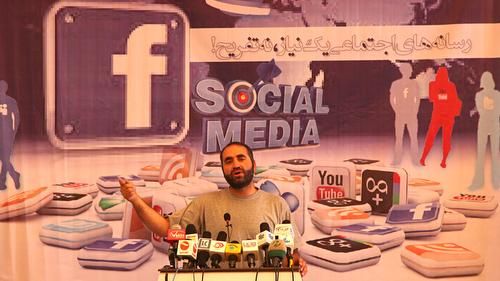KABUL - The power of social media to help bring about changes to society, in areas ranging from social justice to increased accountability in governance, is being highlighted in Afghanistan with events linked to ‘Social Media Week,’ which runs from 23 to 29 July, and which was launched in the capital, Kabul, today.
Organized by a local media watchdog, ‘Nai-Supporting Open Media in Afghanistan,’ several events are being planned to mark the occasion. These include radio debates, social media training for youth, the distribution of appreciation letters to individuals who have helped create social awareness using social media tools and a music concert.
Addressing today’s launch of ‘Social Media Week,’ the Executive Director of Nai, Mujeeb Khilwatgar, said that social media can be an effective advocacy tool for positive social changes in Afghanistan.
“Every individual who has access to internet and social media websites can be a reporter,” said Mr. Khilwatgar. “Ordinary people can share any information – that might be discreet and which formal journalists may not have access to – through social media.”
He called upon young Afghans to use social media platforms to organize and mobilize people for Afghanistan’s presidential and provincial council election, slated to take place in April 2014, so that the country can have a smooth and fair political transition.
According to Nai, the usage of social media is growing rapidly, with there being some 750,000 users of Facebook in Afghanistan now, up from 250,000 in 2012. Similarly, the number of Twitter users is believed to have experienced a significant increase.
Nai-Supporting Open Media in Afghanistan has asked the Ministry of Information and Culture and the Ministry of Social Affairs and Labour, Martyrs and Disabled to officially recognize the week of 23-29 July as ‘Social Media Week’ on an annual basis.
The non-governmental organization has also asked the United Nations Assistance Mission in Afghanistan (UNAMA) and the local office of the United Nations Education, Scientific and Cultural Organization (UNESCO) to follow suit on their respective calendars and schedules.
In her comments at the event, a Nai social media trainer, Haleema Hussaini, said there was a need to introduce a “culture of social media” in Afghanistan.
“The majority of the users use social media in Afghanistan for entertainment purposes,” Ms. Hussaini noted, adding that that there was need to create an understanding that social media had much more diverse uses, such as for social welfare.
Ms. Hussaini flagged that part of social media’s power stemmed from its relatively independent status. “It is not associated with any government ministry and political organization and it also doesn’t work for money,” she added.
The United Nations sees social media as an important tool for empowering youth and promoting accountability. In addition, the world organization has fully embraced new media tools to tell its own story while still relying on traditional means such as radio, television and print to get its messages out. Examples of this include reaching out to audiences, old and new, to explain how the UN is making a difference in events ranging from the political upheaval across the Middle East and North Africa and the multiple crises in the Sahel region, to the UN campaign to end violence against women and girls and ongoing peacekeeping efforts.






